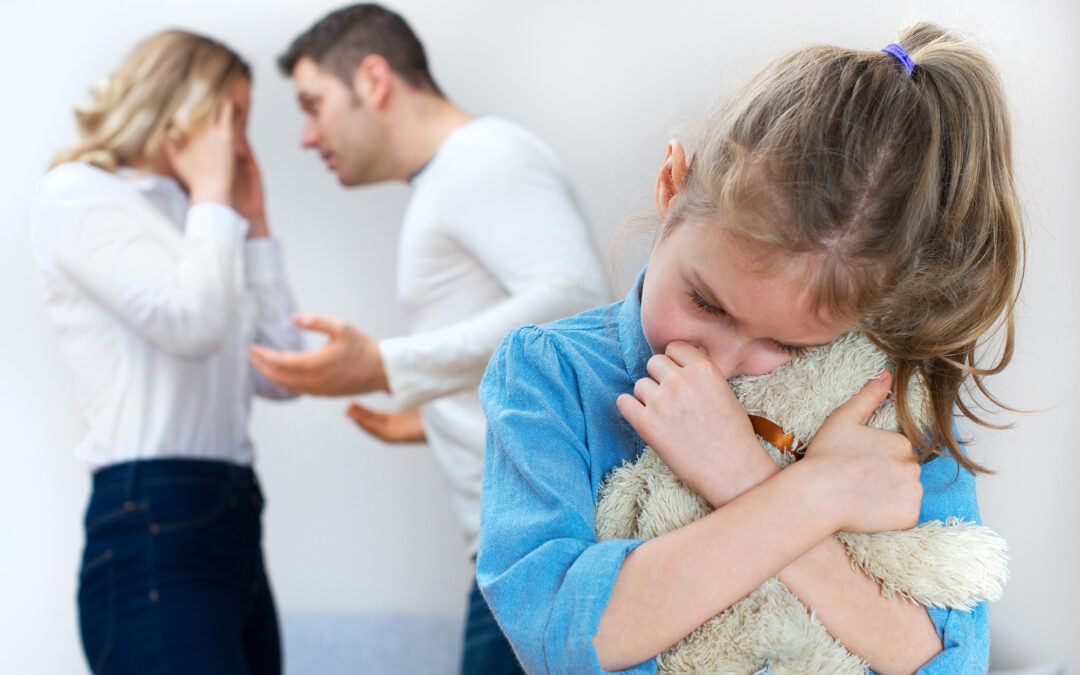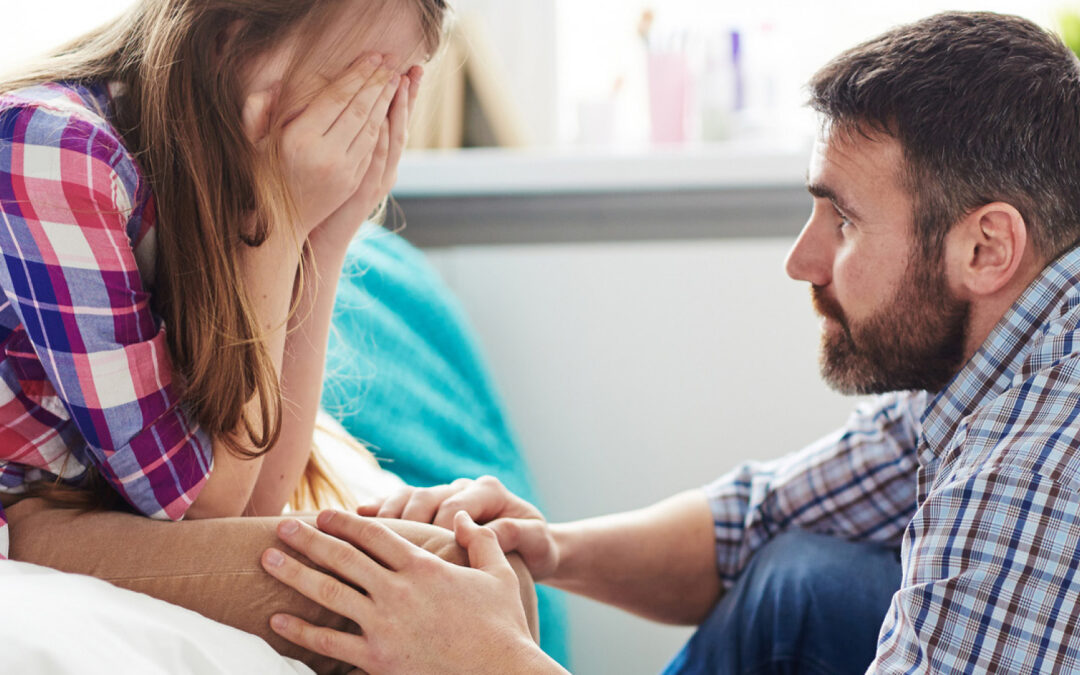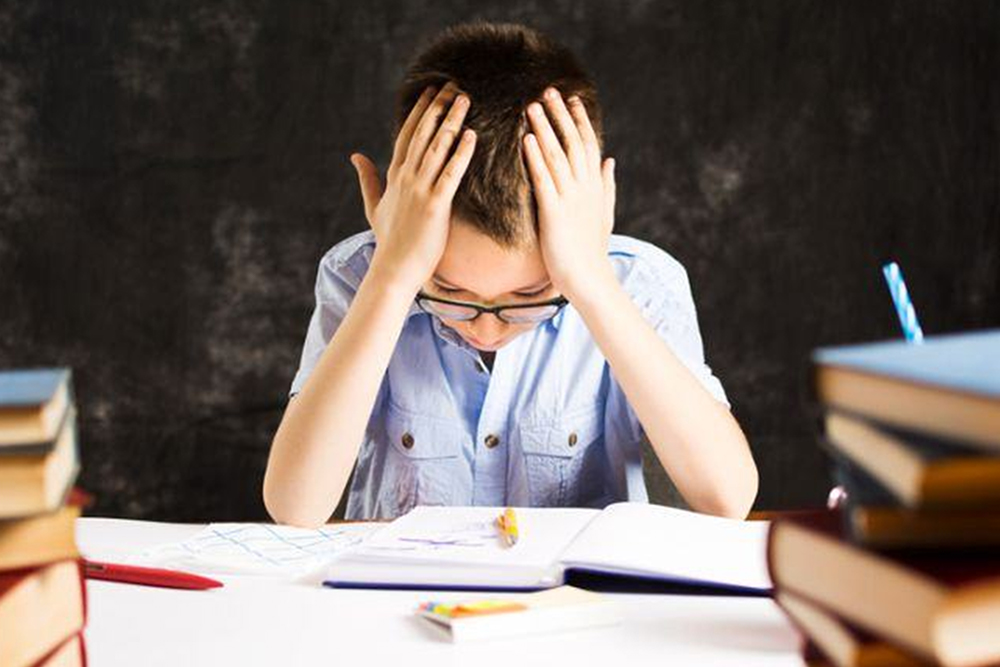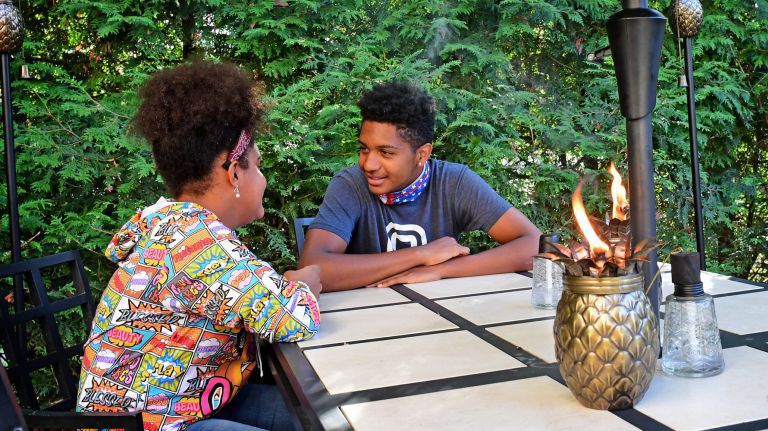
by North Shore Child & Family Guidance Center | May 8, 2025 | Ask The Guidance Center Experts, In The Media
In this monthly column, therapists from North Shore Child & Family Guidance Center answer your questions on issues related to parenting, mental health, and children’s well-being. To submit a question, email communications@northshorechildguidance.org.
Question: Our 16-year-old daughter has been severely depressed since breaking up with her boyfriend, who has been harassing and cyberbullying her. He is posting cruel messages about her online, sharing private details of their relationship to embarrass her, and encouraging others to exclude her at school. We were shocked to learn that he had treated her poorly even before the breakup, though she hasn’t been open about what transpired. Now, she’s saying she just wants to disappear, and we’re terrified she might hurt herself. How can we support her emotionally, protect her from further harm, and help her heal from this toxic situation?
– Helpless Parent
Dear Helpless Parent: Finding out that your child has been a victim of teen dating violence is heartbreaking and difficult to navigate for the entire family. When a teen is experiencing interpersonal abuse, whether psychological, sexual, or physical, it can take a severe toll on their mental health, leading to depression, isolation, and even suicidal thoughts.
It’s important to help your daughter recognize that her ex-boyfriend’s actions of spreading false rumors, name-calling, and threats are tactics of control. Abusive partners often manipulate their victims by making them feel unworthy, isolating them from loved ones, and using technology to harass and intimidate. Unfortunately, this behavior is not uncommon. According to the Centers for Disease Control and Prevention, among high school students who dated, about 1 in 12 experienced physical dating violence, and 1 in 10 experienced sexual dating violence, with females experiencing higher rates of both forms of violence than males.
By creating a safe space for open conversation, you let your daughter know that you are there to listen without judgment. Encourage her to share her feelings and thoughts by asking open-ended questions about what she is going through and what she needs, but understand that it may be difficult for her to talk about the trauma she has experienced. It’s important to reassure her that what happened is not her fault and that she is not alone.
Social media has made it more difficult to step away from harassment that might otherwise be confined to school. Enforcing healthy boundaries and digital safety with your daughter will allow her to feel safe at home again, away from the abuse of her ex-boyfriend. Help her adjust her social media privacy settings to protect herself from further harassment, and ensure that she blocks her ex-boyfriend. Reach out to school officials, who may have protocols in place to keep your daughter safe during the school day.
Recognizing the signs of trauma is vital in helping your daughter heal. If she becomes withdrawn, anxious, or irritable, these may be indicators of further emotional distress brought on by her experience. Signs of depression and suicidal thoughts are immediate cause for bringing her to a professional so that she can begin to work through her distress.
Teens recovering from dating abuse need mental health support to rebuild self-esteem and regain a sense of safety. Individual and group therapy can help your daughter recognize what a healthy relationship looks like and develop the tools she needs to move forward.
At North Shore Child & Family Guidance Center, we provide urgent mental health services for children and families facing dire situations like this. Our Triage and Emergency Services team is here to help your daughter develop the strength to overcome this trauma and the tools to learn what a loving, respectful relationship is like.
To learn more about our lifesaving programs, call the Guidance Center at (516) 626-1971 or visit www.northshorechildguidance.org. In case of an emergency after hours, contact our partners at Long Island Crisis Center, (516) 679-1111.

by North Shore Child & Family Guidance Center | Feb 25, 2025 | Ask The Guidance Center Experts
In this monthly column, therapists from North Shore Child & Family Guidance Center answer your questions on issues related to parenting, mental health and children’s well-being. To submit a question, email communications@northshorechildguidance.org.
Question: Our 16-year-old daughter has been severely depressed since breaking up with her boyfriend, who has been harassing and cyberbullying her. He is posting cruel messages about her online, sharing private details of their relationship to embarrass her, and encouraging others to exclude her at school. We were shocked to learn that he had treated her poorly even before the breakup, though she hasn’t been open about what transpired. Now, she’s saying she just wants to disappear, and we’re terrified she might hurt herself. How can we support her emotionally, protect her from further harm, and help her heal from this toxic situation?
– Helpless Parent
Dear Helpless Parent: Finding out that your child has been a victim of teen dating violence is heartbreaking and difficult to navigate for the entire family. When a teen is experiencing interpersonal abuse, whether psychological, sexual, or physical, it can take a severe toll on their mental health, leading to depression, isolation, and even suicidal thoughts.
Understanding the Abuse
It’s important to help your daughter recognize that her ex-boyfriend’s actions of spreading false rumors, name-calling, and threats are tactics of control. Abusive partners often manipulate their victims by making them feel unworthy, isolating them from loved ones, and using technology to harass and intimidate. Unfortunately, this behavior is not uncommon. According to the Centers for Disease Control and Prevention, among high school students who dated, about 1 in 12 experienced physical dating violence, and 1 in 10 experienced sexual dating violence, with females experiencing higher rates of both forms of violence than males.
Steps of Support
By creating a safe space for open conversation, you let your daughter know that you are there to listen without judgment. Encourage her to share her feelings and thoughts by asking open-ended questions about what she is going through and what she needs, but understand that it may be difficult for her to talk about the trauma she has experienced. It’s important to reassure her that what happened is not her fault and that she is not alone.
Social media has made it more difficult to step away from harassment that might otherwise be confined to school. Enforcing healthy boundaries and digital safety with your daughter will allow her to feel safe at home again, away from the abuse of her ex-boyfriend. Help her adjust her social media privacy settings to protect herself from further harassment, and ensure that she blocks her ex-boyfriend. Reach out to school officials, who may have protocol in place to keep your daughter safe during the school day.
Recognizing the signs of trauma is vital in helping your daughter heal. If she becomes withdrawn, anxious, or irritable, these may be indicators of further emotional distress brought on by her experience. Signs of depression and suicidal thoughts are immediate cause for bringing her to a professional so that she can begin to work through her distress.
Getting Professional Help
Teens recovering from dating abuse need mental health support to rebuild self-esteem and regain a sense of safety. Individual and group therapy can help your daughter recognize what a healthy relationship looks like and develop the tools she needs to move forward.
At North Shore Child & Family Guidance Center, we provide urgent mental health services for children and families facing dire situations like this. Our Triage and Emergency Services team is here to help your daughter develop the strength to overcome this trauma and the tools to learn what a loving, respectful relationship is like.
To learn more, call the Guidance Center at (516) 626-1971 or visit www.northshorechildguidance.org.

by North Shore Child & Family Guidance Center | Dec 28, 2023 | Ask The Guidance Center Experts, Blog
In this monthly column, therapists from North Shore Child & Family Guidance Center answer your questions on issues related to parenting, mental health and children’s well-being. To submit a question, email communications@northshorechildguidance.org.
Question: With the New Year approaching, my daughter comes home from school every day with a different resolution she declares she wants to stick to. I love that she has goals she wants to accomplish, but I want to make sure she isn’t overwhelming herself with too many expectations. How can I help her manage her long list of New Year’s Resolutions, and support her in sticking to the ones she finds important?
-Realizing Realistic Resolutions
Dear Realizing Realistic Resolutions,
As we approach the New Year, many of us are familiar with the enthusiasm our children bring home, declaring a myriad of resolutions they want to accomplish when the clock strikes midnight. It isn’t uncommon for children to overload themselves with things they would like to achieve, widely ranging from eating healthy to becoming the President. Kids need to feel a sense of mastery, and having an abundance of resolutions may make that difficult.
Support is integral in helping kids stay committed to their resolutions. It’s important to begin the conversation by expressing how proud you are of her desire to make choices that will positively impact her and foster an environment of open communication on her journey. Sit down with your child and go over the list together, picking out one or two objectives that are particularly meaningful and realistically achievable. Work together to create a reasonable timeline and break down the goals into smaller, actionable steps. Be sure to celebrate the progress along the way, making the experience enjoyable and enriching for your family. Does she want to be at the top of her class this year? Explain how often she’ll have to study to make that happen and celebrate every A on a test she brings home.
Watch out for signs that your child is overwhelmed, stressed, or frustrated. If she is falling short of her goals and expresses feelings of inadequacy, it’s essential to reassess the situation. This should be an enjoyable experience, so remind your daughter that setbacks are a natural part of growth, and that she can always adjust her resolutions to become more manageable. Always prioritize progress over perfection!
Lastly, encourage making positive changes all year long, not just on New Year’s Day. There is never a bad time to start a goal, and pushing it off until January 1st can make the task more daunting. This goes for adults, too! How often do you wait until the new year to get back into the gym instead of signing up for the membership then and there? New Year’s resolutions can be a great source of motivation, but remember that it’s up to you to make a change in your life, not a date on the calendar.
As the preeminent not-for-profit children’s mental health agency on Long Island, North Shore Child & Family Guidance Center is dedicated to restoring and strengthening the emotional well-being of children (from birth – age 24) and their families. For 70 years, the Guidance Center has been a place of hope and healing, providing innovative and compassionate treatment to all who enter our doors, regardless of their ability to pay. For more information about the Guidance Center, visit www.northshorechildguidance.org or call (516) 626-1971.

by North Shore Child & Family Guidance Center | Dec 7, 2022 | Ask The Guidance Center Experts, Blank Slate Media, Blog, In The Media
Ask the Guidance Center Experts, December 6, 2022
In this monthly column, therapists from North Shore Child & Family Guidance Center answer your questions on issues related to parenting, mental health and children’s well-being. To submit a question, email communications@northshorechildguidance.org.
Question: My son is begging my wife and me to get him a dog for the holidays. We both grew up having dogs in our homes and found it to be very rewarding. But we also know that it’s a lot of work and takes a big commitment to care for a pet – especially a dog! We are inclined to say yes, especially since the pandemic left him feeling pretty low, and we hope this will lift his spirits. Plus, he promises he’ll take on the bulk of the responsibility. What do you think we should do?
— Pet Parenting Puzzle
Dear Anxious Parents: You are wise to take this decision very seriously. Dogs, as well as other pets, do require a lot of care, and if you are lucky, they will be part of your family for many years to come.
You’re also right in realizing that pets can offer many mental health benefits for kids. According to the American Academy of Child and Adolescent Psychiatry, developing loving feelings about pets can contribute to a child’s self-confidence. Positive relationships with pets can aid in the development of trusting relationships with others. And a good relationship with a pet can help in developing non-verbal communication, compassion and empathy.
Some other benefits: Having pets leads to an increase in physical activity; reduces stress; provides companionship and social support; and fosters a connection with the natural world.
Pets provide unconditional love, which is important for every child, but especially helpful for kids who are having difficulties with depression, anxiety and low self-esteem. In fact, research indicates that children with pets tend to have higher levels of self-worth compared to those who don’t have animals. They can also help children with issues such as shyness and autism with their social skills.
All kids, whether or not they have mental health challenges, benefit from their relationships with animals, but if you are considering bringing a pet into your family, here are some factors to consider:
- Kids will promise the moon and stars to get a pet, but as the adult, you are likely to be the one who does most of the caretaking, so make sure you are ready for the responsibility.
- Take finances into consideration. Caring for pets can be an expensive proposition, with estimates running from $500 to well over $1,000 each year.
- Do you have little ones in the house? Children under three or four need to be supervised with pets at all times, since they may be impulsive and risk harming the pet or themselves.
- When choosing a pet, do your research. The pet should be a good match for your lifestyle. For example, if you live in an apartment, you might want to avoid getting a highly active dog. But if you have a fenced-in yard and enjoy tossing the ball around, an energetic pup may be the right fit.
- Are you out of the house for a large part of the day? Pets require care and love, so if you and your family aren’t home most of the time, a dog or even a cat might not be the right pet for you.
- Do your kids have asthma or other allergies? Despite the hype, there really are no allergy-free cats or dogs—but there are some breeds that are less allergenic than others. Ask your vet for suggestions.
Adopting from a shelter is a great way to save the life of an animal. If you decide that you want a specific breed or your heart is set on the type of dog you had as a kid, consider a rescue or shelter pet. Either way, always make sure you speak with the shelter or breeder about the individual history and personality of your prospective pet. Everything is not always apparent when a fury creature is first introduced at a visit.
Whatever you decide, we wish you and your family a happy and healthy holiday!
North Shore Child & Family Guidance Center, Long Island’s leading children’s mental health organization, is seeing clients both remotely via telehealth platforms and in person, depending on the clients’ needs. No one is ever turned away for inability to pay. To make an appointment, call 516-626-1971 or email intake@northshorechildguidance.org.

by North Shore Child & Family Guidance Center | Oct 24, 2022 | Ask The Guidance Center Experts, Blank Slate Media, Blog, In The Media
In this monthly column, therapists from North Shore Child & Family Guidance Center answer your questions on issues related to parenting, mental health and children’s well-being. To submit a question, email communications@northshorechildguidance.org.
Question: Now that life has gotten back to some semblance of normal, my kids (ages 4, 9 and 11) are eager to go trick-or-treating this year. I’m thrilled for them, but the problem is that my little one is absolutely terrified of scary costumes.
As much as he wants to enjoy Halloween activities like his big brother and sister, he’s so frightened that I’m not sure we can take him out. He’s even said he doesn’t want to go to school that day. Any suggestions?
–Costume Conundrum
Dear Costume Conundrum: Halloween is one of the most exciting holidays of the year for youngsters. Candy, dressing up, parties at school—what’s not to love?
But your little one isn’t alone in his fear. For children around three to five years of age, and sometimes even older, the ghoulish costumes and yard displays can be overwhelming and very scary. But be assured, that’s a natural part of their development.
Luckily, most preschools and even elementary schools advise parents to avoid the scary kinds of costumes, so the schools themselves are typically safe zones. But once your son heads out to trick-or-treat, he’s likely to confront some frightening sights.
Of course, you know your son, so you’re the best judge of how scared he is likely to be. But as with all parenting issues, preparing ahead of time and anticipating any problems is the wisest strategy. Some tips:
- Let your son express his fears and reassure him in a calm voice that it’s OK to have those feelings.
- Play a game where your child scares you, and then laugh about it.
- Show him costumes online, so he’ll have an idea of what to expect.
- Do some crafts at home that create ghosts and other Halloween décor. Explain that any scary lawn displays are made of fabric and paint, just like the crafts you made together.
- Some children don’t like something like a mask covering their faces (even though they’ve had to deal with a different kind of mask for some time), so you might want to avoid costumes with masks.
- If he is frightened by costume masks on other people, put one on yourself and take it off to show him that you are still there!
- If your older kids are wearing potentially scary costumes, let your young one watch as they put on their makeup or masks, so he can gradually see how his big brother and sister transformed into the witch or warlock—and that it’s still them under the disguise.
- Make a visit to your local library and ask the librarian for books that help children see that Halloween is full of pretend things—some scary and lots of them just plain fun! One great choice: The Little Old Lady Who Was Not Afraid of Anything.
If your son loves his costume but when Halloween arrives, his mood changes and he refuses to wear it, try a compromise. Let him bring the costume to school instead of putting it on before he goes, or have him just wear part of the outfit. It’s definitely not something worth having a power struggle over, so if he refuses to wear it, let it go. It’s a perfect case of knowing when to pick your battles.
North Shore Child & Family Guidance Center, Long Island’s leading children’s mental health agency, is seeing clients both remotely via telehealth platforms and in person, depending on the clients’ needs. To make an appointment, call 516-626-1971 or email intake@northshorechildguidance.org.

by North Shore Child & Family Guidance Center | Apr 18, 2022 | Ask The Guidance Center Experts, Blank Slate Media, Blog
This story will be published in Blank Slate Media newspapers in April 2022
Helping Your Child Through Divorce
In this monthly column, therapists from North Shore Child & Family Guidance Center answer your questions on issues related to parenting, mental health and children’s well-being. To submit a question, email communications@northshorechildguidance.org.
Question: After much discussion, including couples therapy, my husband and I have decided to divorce. We both know it’s the right thing to do, but we’re very worried about how our kids (we have two girls and a boy, 5, 8 and 10) are going to handle it. Can you offer some advice on how we can best support them during this difficult time?
— Splitting Up
Dear Splitting Up:
The rise in divorce rates in the pandemic period show that you and your husband are far from alone: In 2021, the COVID-19 crisis triggered a nearly 21% increase in divorce filings compared with the previous year.
Whenever there is a separation or divorce, there is no way around the fact that your children will be impacted in profound ways.
And, while divorce doesn’t have the same stigma it did years ago, it still is a difficult event in a young person’s life.
The dissolution of their parents’ marriage can create enormous stress for youngsters. Divorce can be devastating to the children’s feelings of safety, causing fear of abandonment and fear of losing a parent’s love. The result: Anxiety, depression and low self-esteem are common.
Guilt is often another problem, as many children blame themselves for the divorce, believing that it is somehow their fault and that if they had just been “good,” the separation never would have happened.
In addition, many parents make the mistake of talking negatively about their ex-spouse in front of their children. This upsets them because they see their parents as their caretakers, and they need to feel safe and supported by both of them.
When parents put their kids in the middle of their battles, the children struggle with issues of loyalty. Even if they are very caring parents, they may do things inadvertently that cause distress to their child, such as asking the child to talk with the ex-spouse about a change in weekend plans instead of dealing with the adult directly.
Here are some tips on how to help your children deal with divorce:
- Be supportive, reassuring your kids that both of you will always love them and be there for them.
- Encourage them to speak to you openly about all their feelings, and validate that those feelings are normal and completely acceptable.
- Learn how to co-parent the children so there is no confusion on discipline. Rules about bedtime, homework and the like should remain consistent.
- Never talk negatively about the other parent in front of the children.
- If possible, show a united front by attending events like back-to-school nights, games and other activities together.
- Let their teachers know about your separation so they are on the lookout for any troubling behaviors from your children.
- Foster the relationships your children have with your ex’s family so they don’t feel the loss of those attachments.
- Consider placing your child in a therapeutic group so they don’t feel like they are alone in their experience. Many schools have programs like “Banana Splits” offered by school-based social workers.
- Be sure to get support for yourself through this process through friends, family members and professional therapy, if needed.
Remember, the post-divorce relationship with your ex-spouse is perhaps the most important factor in how well your children handle the matter, so do your best to get along for their sake. Knowing that they are loved no matter what by both of you is the most important message. During the pandemic, North Shore Child & Family Guidance Center is seeing clients both in person and remotely via a telehealth platform. To make an appointment, call (516) 626-1971 or email intake@northshorechildguidance.org.

by North Shore Child & Family Guidance Center | Mar 7, 2022 | Ask The Guidance Center Experts, Blank Slate Media, Blog
Published in Blank Slate Media, February 25, 2022
In this monthly column, therapists from North Shore Child & Family Guidance Center answer your questions on issues related to parenting, mental health and children’s well-being. To submit a question, email communications@northshorechildguidance.org.
Question: I have two daughters, 9 and 13 years old. While my youngest tends to approach life with a laid-back attitude, my older one has always been prone to anxiety. Even before the pandemic, she was having panic attacks, but they’ve gotten much worse in the past two years. I had hoped that the return to school and other “normal” activities would help, but it’s gotten so bad that she is avoiding social situations and spending most of her time in her room. How can I help her get over her anxiety?
–Parent Puzzled by Panic
Dear Parent Puzzled by Panic: Anxiety is a normal part of life, for both kids and adults. It would be difficult to find a child who, at some point, didn’t worry about monsters in the closet, or feel apprehensive on the first day of school. Moreover, the last two years have heightened feelings of anxiety for everyone, with the losses, fears and other difficult emotions that have arisen from the pandemic.
In most cases, children’s anxieties are eased with reassurance, love and comfort from an adult in their lives. But for some young people, anxiety is a constant companion. It is part of their everyday lives, and it can seriously impair their functioning. It can lead to debilitating panic attacks, which are characterized by symptoms such as shortness of breath, shaking, dizziness, heart racing and intense fear.
According to the National Institute of Mental Health, nearly a third of adolescents have an anxiety disorder, with about 8% suffering from severe impairment that leads to poor performance in school or missing school altogether; avoiding social situations; isolating; and/or using alcohol or drugs to mask the pain. They often feel alone and ashamed, and their anxiety can contribute to other conditions such as depression and eating disorders.
Studies show that during the COVID-19 pandemic, depression and anxiety in kids and teens doubled compared to pre-pandemic levels. One in 4 youth have significantly higher depression symptoms, while 1 in 5 are experiencing clinically elevated anxiety symptoms.
Although the cause of anxiety and panic attacks is varied, it can include a trauma, a divorce or death in the family or a physical illness. Plus, some people may be biologically predisposed to anxiety and panic attacks.
Here are some suggestions on how to help:
- Encourage your daughter to speak openly about her feelings. She needs to know that she isn’t at fault when she experiences symptoms of anxiety or panic.
- Assure her that, although she may feel she is crazy or is going to die, she is not in any danger.
- If she associates a certain place (such as school) with a panic attack, she may start avoiding that situation. Gentle, gradual exposure is essential, since continued avoidance only strengthens the pattern.
- News and social media can impact children much more than adults, causing them to feel unsafe in their environment, so it’s wise to monitor what your children are watching on TV and on social media.
- Make sure she eats healthy meals, gets enough sleep and exercises. Being physically healthy can lessen the effects of anxiety and panic.
Some other important steps to take include getting an evaluation from a medical professional to rule out any physical ailments that may contribute to anxiety.
The good news is that panic and anxiety disorders are very responsive to treatment, so contact a mental health agency or professional. Tell your daughter that seeing a therapist is a perfectly normal thing to do, and that many kids who experience anxiety are helped through therapy.
During the pandemic, North Shore Child & Family Guidance Center is seeing clients both remotely via telehealth platforms and in person, depending on the clients’ needs. To make an appointment, call 516-626-1971 or email intake@northshorechildguidance.org.

by North Shore Child & Family Guidance Center | Sep 20, 2021 | Ask The Guidance Center Experts, Blank Slate Media, Blog
In the September 2021 column that ran in Blank Slate Media, our staff responds to parents’ concerns that their son may be suicidal.
In this monthly column, therapists from North Shore Child & Family Guidance Center answer your questions on issues related to parenting, mental health and children’s well-being. To submit a question, email communications@northshorechildguidance.org.
Question: We are terribly concerned about our 16-year-old son. Although he is back in school, he has little interest in his classes, and it’s difficult to get him to go to school most days. He’s decided not to try out for the basketball team, which used to be his favorite thing in the world. He’s also stopped reaching out to his friends and become very isolated. When we’ve asked him about all of this, his answer is usually a shrug of the shoulders and some version of “What’s the point, anyhow?” We are incredibly worried and not sure what to do. – Feeling Helpless
Dear Feeling Helpless: There may be no scarier words for a parent to hear from their child than “Some days I just don’t want to go on any longer,” or a similar sentiment. The reality is that children and teens are under more stress than ever, with suicidal thinking and suicide attempts on the rise – plus, the isolation and fear surrounding the pandemic has created a dramatic increase in severe depression and anxiety.
The facts are that suicide is the second leading cause of death for ages 10-24, and more teenagers and young adults die from suicide than from cancer, heart disease, AIDS, birth defects and other diseases combined.
While the problem isn’t new, the pandemic has exacerbated it. Kids’ normal routines were upended in so many ways. They lost milestones like proms, graduations, family gatherings, sports, afterschool clubs and other activities that are important for their development. Even though many of those events have resumed, they are still living with the uncertainty that everything could change at a moment’s notice.
Here are some of the warning signs that your child or teen may be at risk of suicide:
- Withdrawing from friends and family
- Mood swings
- Engaging in risky or self-destructive behavior
- Sleeping more or less than usual
- Changes in eating patterns
- Increased use of drugs or alcohol
- School refusal
- Being depressed and crying often
- Giving away possessions
- Posting suicidal thoughts on the Internet
- Talking about death and not being around anymore
- Cutting themselves
- Aggressiveness or irritability
Your first step should be talking honestly with your son about how he is feeling and communicate your concern in a loving, non-judgmental way.
Ask him directly if he has thoughts of suicide. The idea that talking about suicide will make your child more likely to act upon it is a myth. In fact, the opposite is true.
Let him know there is no shame in feeling depressed or sad and that he is not alone, especially given the unprecedented period we are experiencing.
Also ask him if he has a plan for suicide, since someone who has made a plan is at a higher risk and requires urgent attention. If the answer is yes, monitor him closely and seek immediate mental health services, either through the emergency room or an urgent mental health care facility. One option is Nassau County’s Mobile Crisis Intervention Team, 516-227-TALK.
It is very important that you consult a mental health professional for an assessment. Reassure your son that getting help is not a sign of weakness, but rather shows strength, and that despite his current state of mind, feelings don’t last forever. Allow him to give feedback on what he thinks might be helpful in his treatment.
Nassau County residents can contact us at North Shore Child & Family Guidance Center, which serves young people from birth through age 24.
We promise to see urgent cases within 24 to 48 hours. If, however, you fear that he is in imminent danger, bring him to the emergency room for an immediate evaluation.
North Shore Child & Family Guidance Center’s Douglas S. Feldman Suicide Prevention Project is designed to address high-risk cases with a thorough evaluation for suicide risk, therapy and a comprehensive treatment plan. To schedule an appointment, call us at (516) 626-1971 or email intake@northshorechildguidance.org.

by North Shore Child & Family Guidance Center | Aug 9, 2021 | Ask The Guidance Center Experts, Blog
Helping Kids Manage Stress. Published in Blank Slate Media.
In this monthly column, therapists from North Shore Child & Family Guidance Center answer your questions on issues related to parenting, mental health and children’s well-being. To submit a question, email communications@northshorechildguidance.org.
Question: When I think about my youth, it seems like it was so easy compared to what our children face today. It’s not just the pandemic—although that is certainly an enormous factor—but also the pressures from social media, school, other kids, etc. How can I help my two daughters manage all the stress that they’re facing?
– Missing the Good Old Days
Dear Good Old Days: Many adults reflect on their childhood through rose-colored glasses, remembering fun family vacations, games of flashlight tag, selling lemonade on the corner and all the other good stuff. And there’s certainly nothing wrong with reveling in such memories.
But if we take off those glasses, we’re likely to also remember the pressures of doing well in school, or the bully who made us feel frightened and small, or the fights our parents had over money.
Childhood isn’t now (and probably never was) a scene out of old sitcoms like The Andy Griffith Show or The Brady Bunch. We had plenty of stresses to manage as we grew into adulthood. Still, in modern culture, childhood stress has reached a whole new level.
As you said, the COVID pandemic is unprecedented in our lifetimes, and it not only created new and traumatic issues, it magnified the ones that already existed. While losing a normal year of school brought challenges, for many children and teens, school had been a high-pressure zone for years. Today’s youth are often overbooked with extracurricular activities. And, in the biggest change of all, they experience a constant barrage of social media messages that can often make them feel like they’ll never measure up to their peers.
One thing that is essential to healthy development is free time to daydream, but children and teens spend most of their time on digital devices, be it their smartphones, videogames or other tech gadgets.
And COVID isn’t the only worry haunting our children. Kids are not immune to the news on school shootings, climate change and social unrest, with people taking sides and forgetting how to disagree with a measure of kindness and civility.
All of these messages and non-stop activities can be overwhelming. Following are seven ways you can help your children manage their stress level and find balance in their lives.
- If your kids are booked with activities and homework from dusk to dawn, ask them if they are feeling overwhelmed. Let them know you will not be disappointed if they decide to lighten their schedule.
- While you can’t shield your children from your own stresses, it’s important not to overwhelm them and transfer your anxieties onto them. Be mindful of your language when discussing subjects like financial or health concerns around your kids, especially the little ones.
- How you respond to stressors in your life will have a huge impact on how your children learn to do the same. Next time you are feeling overwhelmed, model behavior that can be helpful to your child, such as taking a deep breath, exercising, reading or spending time in nature.
- Did your child see something on the news or hear something from friends that scared them? Don’t simply tell them not to worry; talk to them about their fears without judgment and reassure them that your family is safe.
- Make sure your child is getting enough sleep. Some quick tips: Eliminate electronics at least an hour before bed; suggest that they read a book, or read with them; and when it’s time to turn off the lights, keep the room dark.
- Kids feel more comfortable when the family has routines that they can depend on. One simple idea: Institute family game night, so everyone will experience a fun and relaxing time together.
- If they are experiencing signs of depression and anxiety that are impacting their daily functioning, don’t be reluctant to reach out for professional help.
During the pandemic, North Shore Child & Family Guidance Center is seeing clients remotely via telehealth platforms or, when deemed necessary, in person. To make an appointment, call (516) 626-1971 or email intake@northshorechildguidance.org.

by North Shore Child & Family Guidance Center | Jul 8, 2021 | Ask The Guidance Center Experts, Blank Slate Media, Blog, In The Media
In this monthly column, therapists from North Shore Child & Family Guidance Centeranswer your questions on issues related to parenting, mental health and children’s well-being. To submit a question, email communications@northshorechildguidance.org.
Question: Our grandson’s pediatrician recently suggested his parents get him screened for autism. We’re so worried and not sure where to turn. Help!
Dear Panicked Grandparents: There are a wide range of autism spectrum disorders, also known as ASD, and many people with the condition live very happy lives. Your first step: Get educated.
Most babies start to show an interest in the world and the people around them at a very young age. By their first birthday, typical toddlers look people in the eye, copy words, play games like peek-a-boo and engage in clapping, waving hello and good-bye and other simple behaviors.
According to the Centers for Disease Control and Prevention, people with ASD—which is a complex developmental disability that manifests in many different ways and to many different degrees—may struggle with social, emotional and communication skills.
Children or adults with ASD might…
- show no interest in objects (for example, not point at an airplane flying over)
- avoid eye contact
- prefer not to be held or cuddled
- appear to be unaware when people talk to them, but respond to other sounds
- repeat or echo words or phrases said to them
- have trouble expressing their needs using typical words or motions
- have trouble adapting to changes in routine.
Other signs include a child not responding to his or her name when called; repeating actions over and over; and having highly restricted interests.
Early intervention is important, but even with older children, treatment can result in real improvements. At North Shore Child & Family Guidance Center, we provide thorough testing and, depending on the results, will create a customized therapeutic treatment plan, which often includes social skills groups and play therapy.
Support groups for caregivers are also very helpful. In addition to parent support groups, we have a program called GASAK, which stands for Grandparent Advocates Supporting Autistic Kids.
Also, our staff includes family advocates who often get involved in the cases, helping clients get appropriate services from their schools and other providers.
The bottom line: It’s important to determine the child’s needs and come up with a good educational and therapeutic plan. Although people with ASD may face challenges, a diagnosis doesn’t mean your grandchild won’t experience feelings of love, bonding and joy. The child is still the same loving child they were before the diagnosis. It’s a condition they have, but it doesn’t have to define their life.
Question: Now that it’s safe to be with their friends, how can I convince my kids to put their phones and tech devices down?
Dear Sick of the Screens: During the height of the pandemic, many families made allowances for extra time on screens and now face resistance to reestablishing more strict limits.
No parent wants technology to rule the roost, especially if it’s making your children isolated. Remember, you have the power!
- Set aside specific times at home when no one (parents included) uses technology. Cell phones, computers, iPads—all must be off. Tech-free time can be spent reading, talking, playing games, cooking, making art… anything creative or social will do.
- Establish a clear schedule. When it comes to gaming, many parents may allow 30 minutes a day during the school week and two hours a day on the weekends.
- When possible, keep all technology in a common space like the living room — not in a child’s bedroom. Avoid allowing your kid to disappear for hours behind a closed door.
- Utilize online services that filter out inappropriate or violent material. These services can also limit Internet access by scheduling times that the Internet is available and times when it is not.
The way you use tech devices influences your ability to effectively guide your children. Although your example is not the sole factor, keep in mind that as distant as some kids become from adults as they are moving through their teen years, they continue to observe you—more closely than you know.
During the pandemic, North Shore Child & Family Guidance Center is seeing clients remotely via telehealth platforms or, when deemed necessary, in person. To make an appointment, call (516) 626-1971 or email intake@northshorechildguidance.org.

by North Shore Child & Family Guidance Center | Apr 24, 2021 | Ask The Guidance Center Experts, Blog
In this monthly column, therapists from North Shore Child & Family Guidance Center answer your questions on issues related to parenting, mental health and children’s well-being. To submit a question, email NSCFGCexperts@gmail.com.
Question: I had my beautiful baby girl two months ago, but being a mother is nothing like what I expected. I am so depressed most of the time that I have trouble getting up in the morning, let alone taking care of my baby. I’m also paralyzed by fear that something bad will happen to her. How can I be so sad when this is supposed to be one of the best times in my life? I feel like the worst mother in the world.
— Distressed Mom
Dear Distressed Mom: It’s very possible that what you are experiencing is a condition known as postpartum (maternal) depression. First off, please know that this is not about whether or not you are a loving and dedicated mother. It’s a disease like any other, and there are steps you can take to get better.
While many women experience some mild mood changes during or after the birth of a child, 15 percent to 20 percent experience more significant symptoms of postpartum depression and other perinatal mood and anxiety disorders.
The symptoms can include feelings of anger, sadness, irritability, guilt, lack of interest in the baby, changes in eating and sleeping habits, trouble concentrating, thoughts of hopelessness and sometimes even thoughts of harming the baby or herself. These symptoms can also begin during pregnancy, not just after they have the baby.
The good news is that help is available. One resource is North Shore Child and Family Guidance Center’s Diane Goldberg Maternal Depression Program. Services include:
- Screening and assessment
- Individual, couple and family therapy
- Crisis intervention consultation
- Psychiatric evaluations and medication management, where needed
- Support groups
- Back-to-work family support
- Help with self-care
Another great place to find help is the Postpartum Resource Center of New York, postpartumny.org, (855) 631-0001.
While motherhood is wonderful in many ways, it’s OK to admit it can be really hard, especially in the beginning. Don’t hesitate to reach out for help!
Question: My son is in fourth grade and is insisting all his friends already have a cell phone. We think it’s too soon. What should we do?
— Old-fashioned Parents
Dear Old -Fashioned Parents: There is no “right time” to give your child his own cell phone—but acquiescing to the “but everyone has one” plea is definitely not a smart move. Is he apart from you often beyond school hours and active with extracurricular activities? That might make it a useful means of communicating with you. Is he typically responsible with his possessions? Is he good when it comes to respecting limits you put on screen time?
If you feel like it might be useful for him to have a cell phone but you think he is too young for access to texting or the Internet, look into plans that only allow phone calls. Other plans will allow for just calls and text, but that’s all.
Stay tuned for next month’s column, when we’ll talk about how to regulate your child’s use of phones and other tech devices.
During the pandemic, North Shore Child & Family Guidance Center is seeing clients remotely via telehealth platforms or, when deemed necessary, in person. To make an appointment, call (516) 626-1971 or email intake@northshorechildguidance.org.
by North Shore Child & Family Guidance Center | Apr 15, 2021 | Ask The Guidance Center Experts, Blog
In this monthly column, therapists from North Shore Child & Family Guidance Center answer your questions on issues related to parenting, mental health and children’s well-being. To submit a question, email NSCFGCexperts@gmail.com.
Question: We think our son might be engaging in unsafe driving behavior. The other night, he came home from being out with a friend and we could smell beer on his breath. Worse, he’d been the driver. What can we do?
—Nassau Parents
Dear Nassau Parents: You have reason to be concerned. The statistics are frightening: More teens die from motor vehicle crashes than any other cause of death, and teen drivers are 17 times more likely to be involved in a fatal car crash when they have alcohol in their system as opposed to when they are sober.
The same holds true for marijuana and other drugs. A report from Liberty Mutual and SADD (Students Against Destructive Decisions) found that one in five teens admit driving under the influence of marijuana, and one in four say they would take a ride from a driver impaired by alcohol or prescription drugs.
While many adults make foolish decisions about driving when they’ve been drinking, teenagers are even more susceptible to feeling like they’re safe to drive even when intoxicated. Their brains are still developing, and they tend to behave more impulsively, especially when they are under the influence of drugs or alcohol. Plus, when they do consume alcohol, teens are more likely to binge drink than adults.
While the good news is that drinking and driving among U.S. teens has gone down by more than half since 1991, they still drive after drinking an average of 2.4 million times a month.
As a parent, you play a crucial role in your teen’s choices, even though sometimes it might not feel that way. Some ways you can encourage safe driving include:
- Make a driving contract with your teen that agrees upon zero tolerance for drinking alcohol or using drugs when driving.
- Tell them that getting in a car with anyone who has been drinking or using substances is never OK.
- Promise you will pick them up if they end up in that circumstance.
- Insist upon a “no texting while driving” rule—or their phones will be taken away.
- Require seat belt wearing for both the front and back seats, even for a short trip.
- Consider limiting nighttime driving, especially if your teen is a new driver.
- Be a good role model: Follow all the rules of the road and never drink and drive.
Question: I hear about all the things people are accomplishing with their pandemic “down time,” but I feel more stressed than ever, since I’m working at home and have two kids who are in remote schooling part of the time. Am I being too hard on myself?
—Tired All the Time
Dear Tired: In a word, yes! Despite the fact that Shakespeare purportedly wrote King Lear during a pandemic, he surely didn’t have kids pulling on his cloak and asking for help with homework.
The stresses brought on by the COVID-19 crisis have been overwhelming. Please give yourself a break! You don’t need to master crocheting or learn a new language right now. And don’t forget to take care of yourself while you’re focusing on everyone else’s needs. Whatever it is that soothes you—yoga, a warm bath, some time on Netflix—put it in your schedule. And ask for help, whether from your spouse, friend or another person who cares about you. You won’t be a good parent if you are burned out.
During the pandemic, North Shore Child & Family Guidance Center is seeing clients remotely via telehealth platforms or, when deemed necessary, in person. To make an appointment, call us at (516) 626-1971 or email intake@northshorechildguidance.org.

by North Shore Child & Family Guidance Center | Feb 18, 2021 | Ask The Guidance Center Experts, Blog
In this monthly column, therapists from North Shore Child & Family Guidance Center answer your questions on issues related to parenting, mental health and children’s well-being. To submit a question, email NSCFGCexperts@gmail.com.
Question: My sons, who are four and seven, seem to be having more bad dreams than usual. They’ve both woken up during the night saying they were scared that we would die or get sick and they’d be left all alone. Any tips how to handle these nightmares?
—Up at Night
Dear Up at Night: The pandemic is impacting the daily lives of our children in numerous ways, with anxiety related to remote learning difficulties, loss of social activities and fear of illness and death creating a mental health crisis. So, it’s no surprise that COVID worries are also encroaching on their nights.
With our younger clients, we use creative ways such as drawing or playing with toys to help them express and process their fears. Many of them have been drawing scary monsters or big waves that overwhelm them, which reflects the fact that feel they have no control over the virus. Odds are that your boys are having the same thoughts.
There are several things you can do to help your kids at bedtime. First, suggest that they comfort themselves with items that help them feel safe, such as a favorite stuffed animal or a special blanket. You could also try a practice that we use with clients, called “Grounding in the Five Senses,” which involves thinking about five things you can see, four things you can touch, three things you can hear, two things you can smell and one thing you can taste. This process helps them let go of their worry of the future and focus on the here and now.
Some other strategies:
- Stick to their normal bedtime routine, perhaps reading an extra book that focuses on a happy, comforting topic.
- Validate their worry and other feelings so they feel seen and heard.
- Model reassurance and safety either verbally (“I’m here, I will protect you”) or physically with a hug.
- Encourage them to imagine happy endings for their dreams before bedtime.
- Limit their exposure to COVID-related news—but do respond to any of their questions in an age-appropriate way.
Question: As the mom of a daughter who has depression and anxiety, I feel guilty thinking about spending time on my own needs. Is it selfish to want some me-time?
—Exhausted Mom
Dear Exhausted Mom: Have you ever heard that if an airplane loses cabin pressure, parents should put on their oxygen masks first, so they are able to help their children?
It’s way past time that moms (and dads, too) learn that self-care isn’t selfish, especially if you have a child with special needs. If you are depleted and neglect your own mental and/or physical health, you won’t be able to be there for your family.
Prioritize your wellness, even if you have to tell yourself you are doing it for your daughter. The basics: Get enough sleep; fit in some exercise, even in five-minute spurts (it all adds up!); add a short period of meditation to your daily routine; and eat healthy foods. Most important of all: Ask for help! Family and friends rally around you if your child has cancer. Chances are, they’ll want to be there for you when the issue is mental health.
During the pandemic, North Shore Child & Family Guidance Center is seeing clients remotely via telehealth platforms or, when deemed necessary, in person. To make an appointment, call us at (516) 626-1971 or email intake@northshorechildguidance.org.

by North Shore Child & Family Guidance Center | Jan 19, 2021 | Ask The Guidance Center Experts, Blog
In this new monthly column in Blank Slate Media’s The Island Now newspapers, therapists from North Shore Child & Family Guidance Center answer your questions on issues related to parenting, mental health and children’s well-being. To submit a question, email NSCFGCexperts@gmail.com.
Question: We’ve recently been concerned that our teen daughter seems to be feeling more blue than usual. Her grades have been going down, and she wants to sleep all the time. When we ask her how she’s doing, she gets very emotional. Should we be worried?
—Panicked Parents
Dear Panicked Parents: The pandemic has created an enormous amount of stress, anxiety and sadness for all of us, including our kids. We’ve been dealing with this strange, new reality for eight months now, and there’s no clear answer as to when we will turn the corner and be back to our routines.
The fact that your daughter is feeling stressed and sad isn’t surprising; in fact, studies indicate that these feelings are on the rise all over the country. Changes in sleep and eating patterns are common, as are struggles with the unusual school schedule. Kids are also worried that their loved ones may become ill.
It’s crucial that you always keep the lines of communication open. As parents, we tend to jump in to try to “fix” what’s wrong, instead of realizing that sometimes, your child just needs you to listen and be empathetic, acknowledging their feelings and assuring them you are there for them.
There are some things you can do to help your daughter, and yourselves, during this challenging time. Basics like eating healthy foods, exercising regularly, spending time outside in the fresh air and setting up a regular school and sleep routine can make a big difference.
Of course, it’s important to look out for signs that your daughter’s issues might be more significant and require therapeutic intervention. Some warning signs: a continued drop in grades or refusal to go to school; withdrawing from friends and family; significant changes in weight, either losing or gaining; the inability to feel joy; increased anger; physical complaints like headaches or stomachaches; use of drugs or alcohol; and expressing thoughts of suicide or preoccupation with death.
North Shore Child & Family Guidance Center is seeing children and teens via remote therapy during this time, or in person when the situation calls for it. Our Douglas S. Feldman Suicide Prevention Project offers a host of services to help children and teens experiencing suicidal thoughts. Don’t hesitate to call us at (516) 626-1971 for an evaluation.

by North Shore Child & Family Guidance Center | Dec 1, 2020 | Ask The Guidance Center Experts, Blog
In this new monthly column, therapists from North Shore Child & Family Guidance Center will be answering your questions on issues related to parenting, mental health and children’s well-being. To submit a question, email NSCFGCexperts@gmail.com.
Question: We’ve recently been concerned that our teen daughter seems to be feeling more blue than usual. Her grades have been going down, and she wants to sleep all the time. When we ask her how she’s doing, she gets very emotional. Should we be worried?
—Panicked Parents
Dear Panicked Parents: The pandemic has created an enormous amount of anxiety and sadness for all of us, including our kids. We’ve been dealing with this strange, new reality for eight months now, and there’s no clear answer as to when we will turn the corner and be back to our routines.
The fact that your daughter is feeling stressed and sad isn’t surprising; in fact, studies indicate that these feelings are on the rise all over the country. Changes in sleep and eating patterns are common, as are struggles with the unusual school schedule. Kids are also worried that their loved ones may become ill.
It’s crucial that you always keep the lines of communication open. As parents, we tend to jump in to try to “fix” what’s wrong, instead of realizing that sometimes, your child just needs you to listen and be empathetic, acknowledging their feelings and assuring them you are there for them.
There are some things you can do to help your daughter, and yourselves, during this challenging time. Basics like eating healthy foods, exercising regularly, spending time outside in the fresh air and setting up a regular school and sleep routine can make a big difference.
Of course, it’s important to look out for signs that your daughter’s issues might be more significant and require therapeutic intervention. Some warning signs: a continued drop in grades or refusal to go to school; withdrawing from friends and family; significant changes in weight, either losing or gaining; the inability to feel joy; increased anger; physical complaints like headaches or stomachaches; use of drugs or alcohol; and expressing thoughts of suicide or preoccupation with death.
At North Shore Child & Family Guidance Center, we are seeing children and teens via remote therapy during this time, or in person when the situation calls for it. Don’t hesitate to call us at (516) 626-1971 for an evaluation.
Question: My eight-year-old son is in school two days a week and home the other three doing remote learning. While he’s been on this schedule for over two months now, he still struggles at times. What can I do to help?
—Port Washington Mom
Dear PW Mom: It’s common for kids of any age to have difficulty remaining focused on their remote schoolwork, since being at home offers up all sorts of temptations and distractions.
While it can be hard for parents to manage their children’s classwork alongside their own work and other responsibilities, familiarize yourself with your son’s school schedule to ensure he attends online classes and doesn’t miss assignments.
Another way to set him up for success is to create a small, quiet area where he can attend classes and do his homework. You can make it more appealing by personalizing the space with poster boards decorated with name tags, stickers and maybe some favorite photos.
Here are a few more pointers for all parents:
- Encourage movement – build in time for exercise and movement before and during your child’s school activities.
- Reduce distractions including noise and visual clutter.
- Enlist your child in setting up a designated workspace that is comfortable.
- Give your child, and yourself, breaks during the day.
- Particularly for young children, give immediate positive feedback like a sticker or check mark on completed work to help with their motivation.
- Establish good and healthy routines in the home.

by North Shore Child & Family Guidance Center | Oct 17, 2020 | Ask The Guidance Center Experts, Blog
In this new monthly column, therapists from North Shore Child & Family Guidance Center will be answering your questions on issues related to parenting, mental health and children’s well-being. To submit a question, email NSCFGCexperts@gmail.com
Question: My son and daughter are athletes on their school’s sports teams, and they’re really struggling with the loss of these activities due to the pandemic. How can I help them deal with this difficult situation?
—Sports Mom
Dear Sports Mom: Being part of organized sports is such an important part of life for many of our children and teens, and you’re correct in describing this as a loss.
The many benefits of sports to a child’s physical and mental well-being are well known. Sports help kids develop fine motor skills, reduce stress and boost their immune systems. Children who participate in sports tend to have greater self-esteem. They learn teamwork, responsibility and perseverance, and they develop lasting friendships.
Many of our kids are experiencing a deep sense of grief. They’ve not only lost sports, but also many other important activities and the many relationships closely tied to those experiences.
As with any disappointment, encourage your child to discuss their feelings instead of keeping them all bottled up. You never want to give the impression that this isn’t a big deal. It is!
While they may want to spend more time on their screens, it’s important to set limits. Too much screen time is likely, in the long run, to make kids feel more isolated, unmotivated and demoralized. It’s fine to relax those rules to some degree, allowing for the diversion and connection with their peers, but don’t abandon reasonable limits altogether.
Perhaps your most important tool is to create other opportunities to keep your child healthy and engaged. Those could include family walks or other physical activities, such as practicing drills together or doing an online exercise class.
Although we don’t have a timetable for when the pandemic will be over, let your kids know that the best medical experts in the world are working on the solution and that you are optimistic that things will return to normal.
Question: Our daughters, one in middle school and the other in elementary, were taunted by one of their classmates because they are Chinese Americans. The boy called them derogatory names and said that they caused the pandemic. What can we do to protect them from this type of discrimination?
—Heartbroken Parents
Dear Heartbroken Parents: Sadly, anti-Asian bias has been widespread throughout the country and right here on Long Island. Verbal and even physical assaults against kids and adults have risen dramatically.
Your first job is to listen to your children closely and validate their feelings. They are likely frightened, angry and even embarrassed—all normal responses to such a traumatic event. Tell them they have nothing to be ashamed of and being bullied is not their fault.
Report the incident to their teacher, guidance counselor and principal. Suggest that they discuss bias and racism in the classroom and assemblies. Students need to be taught that any type of racist behavior or slurs will not be tolerated. They also need to learn about the value of diversity from a very early age.
Some more important steps:
- Advise your children to record these interactions with their phones as soon as they begin.
- Give children age-appropriate facts about the virus, so they know no culture is responsible for the pandemic.
- Model the behavior you want to see in your children by being anti-racist yourself.
- Teach them to stand up for themselves respectfully without escalating the situation further.
If the bias is an ongoing problem or there is any physical harm or threat of harm, contact the police, and make sure your children know to dial 911 if they are ever in danger. You can also report the incident to Nassau County’s Office of Asian-American Affairs at (516) 572-2244.

by North Shore Child & Family Guidance Center | Sep 21, 2020 | Ask The Guidance Center Experts, Blog
By Beth Whitehouse, Newsday, September 18, 2020
Photo: Olivia, 11, and Samuel Murad, 15, were both anxious and excited about returning to school. Credit: Newsday/Thomas A. Ferrara
Olivia Murad, 11, was anxious about more than just entering a new school with new teachers and new classes ahead of her first day of middle school in Great Neck. This year, she also has to deal with concern of the coronavirus.
“She’s a little nervous; wants to know if she’s going to be safe,” says Olivia’s mom, Ianthe, 46, a clinical audiologist. Murad and her husband, Rachid, 48, who works in human rights at the United Nations, have decided it’s important to send Olivia back to the classroom alternate days according to the district’s hybrid plan. “We really have been attached at the hip since lockdown in early March,” Murad says of herself and her daughter. “I feel that the social component is so critical at this age.”
So does Olivia. “When I heard we had to do online school, I had no motivation to get up in the morning and do my work,” she says. “My motivation is seeing my friends.”
Samuel, 15, who is in 10th grade at a private school, is attending five days a week. “I’m very happy about that,” Samuel says. “Getting back to a normal schedule, waking up really early, going to class.” He jokes that he should have readjusted within the first two months.
Like other parents, the Murads are hoping their children adapt easily and any anxiety fades away. “This is a major moment. They’re going to school during a pandemic, which has upended everybody’s world and is pretty scary,” says Karen Fleiss, psychologist and clinical director of the NYU Langone Child Study Center’s Long Island office in Lake Success. Fleiss and other experts offer these 10 ways to help the fall be happier for tweens and teens:
1. Understand and validate
Parents should validate their teen’s feelings to help them process emotions instead of internalizing them, says Elissa Smilowitz, director of triage and emergency services for the North Shore Child and Family Guidance Center in Roslyn Heights.
Mark Lashley, a pediatrician at Valley Stream Pediatrics, part of Long Island’s Allied Physicians Group, likens the pandemic to a rock thrown into a pond creating ripples. “Covid has added a layer of complexity to these worries kids have and the stress they feel,” he says. Separation by six feet may hinder their typical manner of socializing. “They’re worried about the joyful activities they were expecting to have and whether they’re going to have them.”
Parents can be an outlet. “Sometimes teenagers are just looking for people to hear them,” says Pia Alexander, a family therapist in private practice in Brooklyn and Mineola who has two teenagers.
2. Be flexible
“Because things are changing so much moment to moment, it requires a lot of flexibility,” Alexander says. Not just from the kids. “When things don’t look the way you were expecting, it’s about how you respond to those differences.”
Do what’s right for your family and your children, Alexander advises. “Instead of comparing your own family to what other families are doing on social media, families have to define what is special to their own family,” she says. “People are curating these images to put out a story they want to represent them instead of what is really going on.” Eschew the “shoulds,” she says. “Families are going through different experiences.”
3. Try to foster excitement
“There’s an undercurrent of disappointment in what school is actually going to be like this year. They know what it was like in the spring, and they didn’t love it,” Fleiss says. “The energy of the new school year, all the newness of it, it’s just not there.”
Fleiss has one client, she says, who asked her mom if she could change her room around to make it different and a fresh start for the school year; parents can try to help students find ways to feel more engaged.
4. Accept your child’s weaknesses
Accepting their vulnerabilities can reduce family stress. Kids may be worried whether their friend groups will still accept them after having been apart, Smilowitz says. “The worry is, ‘Are they going to talk to me?’” They may have fears about their academic performance.
“Your kid might not be able to achieve everything they would in a typical year,” warns Caroline Mendel, a private practice psychologist from the North Shore. Adjusting expectations will make everyone happier, she says.
Acknowledge that this is hard. “When you see them off task, remind them that you’re with them and they can do it,” says Don Sinkfeld, a mental health practice owner in Valley Stream who has a 13-year-old daughter. Adolescents don’t relish hearing a parent say, “Didn’t you get the instructions about how to turn this assignment in?” “If the kids feel like they’re going to disappoint you, they’re not talking,” Sinkfeld says.
5. Impose daily structure
“Children don’t have the best, what we call in pediatrics, ‘executive functioning.’ They need guidance,” Lashley says. “Providing structure is very important — time for work, time for play, time for bed, time for exercise.”
That routine may look different from a year ago, but a predictable routine is grounding, Mendel agrees. Parents may need to help children break academic tasks down into manageable steps, she says.
Try to limit electronics, Lashley adds. “We lump all electronic devices — TV, tablet, phone and gaming consoles — into one category,” he says. During the summer, experts told parents they could relax the normal advice to keep children entertained in isolation. But now, parents ought to resume some restrictions, Lashley says. The American Academy of Pediatrics guidelines recommends teens have no more than two hours of recreational screen use per day, he says.
6. Allow teens some autonomy
“They’re in this stage where they need to start making decisions,” Fleiss says. Come up with your non-negotiables, what are absolute musts for you, and then allow some choice and ownership on other decisions, experts say.
“Instead of imposing boundaries, you want to discuss it with them, especially with older teens,” Alexander agrees. Say, for instance, “In our family, we all try to get to sleep at this time. Does that feel reasonable to you? What do you propose?”
7. Try to offer socialization outside of school, albeit safely
“Any therapist who works with teens knows that the social setting — their peers, their friends — is the most important thing for them,” says Kathy Sionit, a social worker in private practice in Great Neck who has five children between 11 and 17.
Schools that are totally remote or keeping children six feet apart may not truly offer satisfying socialization, Alexander says. “Parents should, as much as they can, and by what is safe for their family based on medical issues, try to tailor some social interaction for their tweens and teens with others.”
8. Embrace nature
A positive during the pandemic has been the amount of time tweens and teens may be spending outside, Sionit says. Other experts echoed her. “Getting outside into nature is very helpful for children who are having trouble adjusting,” Lashley says.
9. Have a sense of humor
Tweens and teens are trying their best, Sinkfeld says. When things go wrong, try to laugh. “Have a sense of humor about it.”
10. Watch for depression/anxiety
Some teens may experience depression, anxiety, hopelessness, apathy, loss of motivation, even suicidal ideation, experts say. Parents should watch for changes in sleep patterns and appetite, increased irritability or sadness, and decreased ability to concentrate, Lashley says.
It may be a temporary adjustment disorder, Sinkfeld says. “Adjustment disorder means the person is experiencing some kind of life event that they are having trouble adjusting to. COVID changes to school and household routine, even how you learn, that is definitely a huge adjustment,” Sinkfeld says. If parents are seeing signs, they should consider reaching out to a professional for help, experts say.













